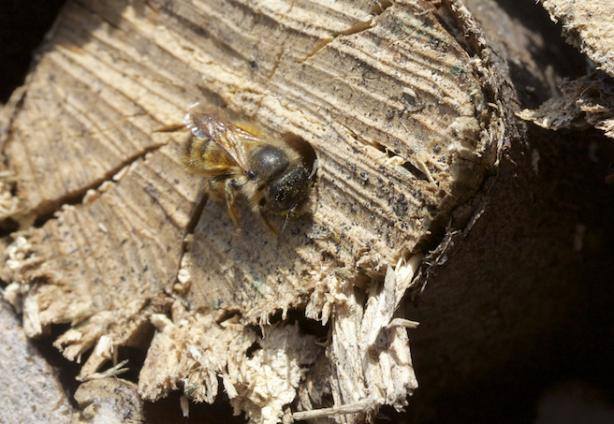Everyone loves bees. Bees are colourful and come in all shapes and sizes. Everyone talks about them. Bees are cool. Bees are hip at the moment… but bees are disappearing from our landscapes. Disappearing fast! So they need a helping hand wherever they can get one.
Imagine the buzzing sound of a wild bee, 24 children standing close by, following its every move, eyeing it closely as it enters its nest site.
The weather--as is often the case in May (and on weekends) in Luxembourg--wasn’t great last Saturday, cloudy with occasional showers. These conditions, on the other hand, also meant that the bees were less active, giving the kids a good opportunity to observe and even touch these little critters.
Touching a bee? Don’t they sting? Well, no. Most of our wild bees--unlike the honeybee--are solitary. Not having a queen or bee hive to protect, means that they are not as aggressive and many of them have lost the ability to sting. As long as you don’t bother them too much, they won’t mind if you observe them up close.
But bees were not the only reason why 24 kids (many together with their parents) joined the English-speaking section of natur&ëmwelt at the House of Nature in Kockelscheuer on Saturday. After getting some inspiration from natur&ëmwelt’s existing insect shelters and getting to know some of the current residents (mostly wild bees), kids were asked to build their very own insect “hotels”.
Armed with all kinds of tools, wooden planks and material to go into the individual hotels, the kids went straight to work. Together with the help of their parents they started hammering and drilling away. All kinds of material--moss, empty snail shells, reeds, logs and pine cones--were used to decorate the hotels and make it a snug home for bees, spiders, earwigs and beetles.
Many of these little critters and potential future inhabitants of the newly constructed homes are great helpers in everyone’s garden or backyard; they pollinate flowers, keep other pest species, such as aphids, mosquitoes and hungry caterpillars at bay or simply get rid of all dead or decaying plant material.
Insect hotels are a great way of supporting local wildlife and are becoming increasingly popular. They are easy to build and help a variety of insects. Wild bees especially benefit from these aids as they provide them with many different opportunities in which to build their breeding chambers. They love to occupy tunnels and cavities left behind by beetle larvae inside dead wood or hollow plants.
Bees in Luxembourg
Wild bee larvae need a complete year to develop from an egg into a fully-grown bee. While they don’t produce honey, they are extremely efficient pollinators. There are well over 300 species of wild bees in Luxembourg alone (and only one species of the domesticated “honey bee”) and their business has been shown to increase crop productivity by up to 30%. Like most other insects, wild bees aren’t faring very well in our modern world.
Loss of flower-rich grass meadows and premature cutting--whether on agricultural fields or in our backyards--are but one of many problems they face. Excessive use of pesticides and fertilisers only add to their problems. Our love for perfectly trimmed green lawns just doesn’t leave them enough room for foraging or nesting.
The next time you want to tidy up your garden think about dedicating a small patch of your garden to wildlife, leaving a small strip of uncut grass, or maybe even putting up an insect shelter, which will support a wide variety of useful little critters, which in turn will help you keep down many of those annoying pest species (and provide you with a perfect excuse for not having to mow the lawn yet again).
One of our upcoming events is the annual Nature Festival that takes place from 10 a.m. to 6 p.m. on June 29 at the House of Nature in Kockelscheuer. This year’s theme is on the importance of the protection and conservation of bees. Click here for more information and to register.
Marie Kayser is a volunteer with conservation group natur&ëmwelt’s English-speaking section. Contact the section via email at [email protected], and sign up to its mailing list here. The section’s full event calendar and registration details are published here.
